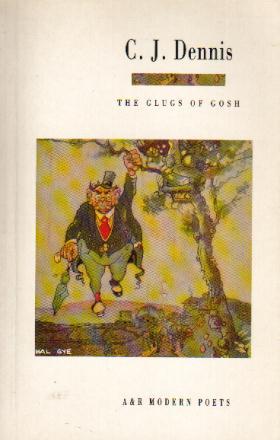
|
The Glugs of Gosh C.J. Dennis 1917 |
|
Dustjacket Synopsis:
Meditate deeply on softgoods or sex,
On caraway seeds or the causes of bills,
Biology, art, or mysterious wrecks,
Or the tattered white fleeces of clouds on blue hills.
Muse upon ologiess, freckles and fog,
Why hermits live lonely and grapes in a bunch,
On the ways of a child or the mind of a dog,
Or the oyster you bolted last Friday at lunch.
The Glugs of Gosh is a satirical gallop through the world of the inhabitants of Gosh, a world that seems to he suspiciously full of the same frailties and absurdities as our own ... From the pride and petulance of kings, judges, mayors and teachers to the dangers of importing luxury goods and exporting weapons, C. J. Dennis exhibits an unerring eye for immortalising the little failings and idiosyncrasies of human nature in entertaining, rollicking verse. Published here with a new introduction by John Derum and Hal Gye's original illustrations from 1917, this piquant Austrahan classic is fun for children and adults alike. C. J. Dennis is best known as the author of the classic The Songs of a Sentimental Bloke, as well as many other titles such as Doreen, Digger Smith, Jim of the Hills, A Book for Kids and The Moods of Ginger Mick. First Paragraph from the Introduction by John Derum The Glugs of Gosh is a masterpiece. Not just an Australian masterpiece, and not just C. J. Dennis's masterpiece. It is a masterpiece of our language, and it will be a surprise to many people that it was created by a writer still associated with the particularly Australian idiom of his most popular character, The Sentimental Bloke. The Glugs of Gosh describes the journey of our society in the twentieth century. It is all the more remarkable that it was written and published so early in the 1900s. Dennis could already see the problems in our systems of education, trade, defence and democracy. He was concerned that his earlier work The Moods of Ginger Mick had been used to support the case for war, and he was keen to put the record straight about his own view. In The Glugs, Dennis gives us a hero who would be at home much later in the century when we began to understand, at last, our individual spirituality and the significance of our natural environment. In a comprehensive social satire that touches all of the major social issues, from the nature of government and justice to education and trade, Dennis's observations about domestic possessions are possibly the earliest of the kind that were developed by Barry Humphries so effectively nearly half a century later. From the Angus & Robertson paperback edition, 1993. |